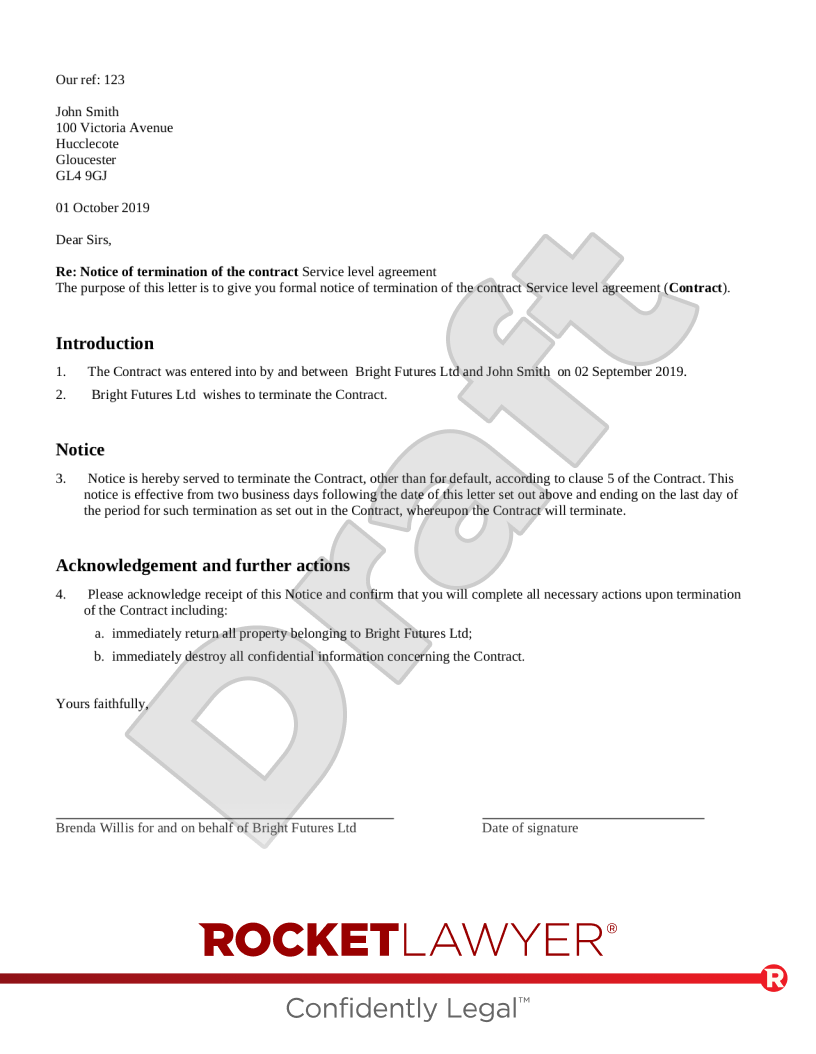Check the contract first
A contract will usually contain provisions setting out when and how it can be terminated (ie ended). This is the best starting point for working out how you will end a contract. For example, the contract might state: ‘This Agreement shall be terminated upon the expiration of thirty (30) days after either party hereto shall give written notice to the other party of its intention to terminate.’ Or, it could simply state that ‘This Contract will continue until ended by either party’s giving the other 14 working days’ notice of their intention to terminate’.
Reasons for terminating a contract
There are different circumstances in which a contract may be ended. Check which of the following common types of termination may apply to you.
Termination for convenience
A contract may allow termination for any (or no) reason, as long as specified notice requirements are followed. The applicable notice period will be found in the contract (eg 30 days).
If a contract doesn’t specifically allow you to terminate for convenience, you cannot just end the contract because it no longer meets your or your business needs. Always consider this when agreeing to enter into a contract. Being able to get out when you want, for any reason, is often important.
Termination for cause
Termination for cause generally refers to the ending of a contract due to a party’s default or failure to perform an important element of the contract (ie a significant breach of contract) that induces the other party to want to end the contract.
Before attempting to bring a contract to an end for this reason, evaluate the likelihood of your success by considering the following:
-
is there a sufficiently serious problem with an important part of the contract?
-
was this problem caused by the other party?
-
have you (ie the party wanting to end the contract) done anything that might be taken as having caused, encouraged, or accepted this behaviour instead of complaining about it?
-
have you given the other party sufficient warning to remedy the problem within a fixed time?
You should also check the terms of the contract for any provisions about when it may be ended due to a party’s breach of contract. For example, it may be specified that a party may end the contract if the other party breaches a certain term, but only if they first notify that party of the breach and give them a specified period of time to remedy it.
Ending a contract due to force majeure or frustration
If performing its obligations under a contract has become impossible or substantially different due to an event outside of its control, a party may be able to end the contract in reliance on a force majeure clause or the legal doctrine of frustration.
A force majeure clause sets out what happens if certain specified events occur that are beyond the relevant party’s control (eg a natural disaster, tsunami, war, or riots) and this prevents the party from performing its obligations under the contract (eg delivering goods or providing services). If an event and its consequences are covered by a valid force majeure clause, this clause may allow a party to end the contract.
If a contract doesn’t have a force majeure clause, or its force majeure clause doesn’t cover a given event, a party may be able to end the contract in reliance on the legal doctrine of ‘frustration’ if performance of its obligations becomes impossible or radically different.
For more information, read Force majeure.
Termination for other reasons
Some other fairly common ways of ending a contract include:
-
termination for insolvency - ie termination because the other party has become insolvent in some way or is unable to pay their debts
-
ending because the contract was for a fixed period of time which has now ended
-
ending because the parties simply agree to bring the contract to an end (the rules on varying a contract will need to be followed)
How to send notice of your intention to end a contract
A written notice should generally be used for any type of termination (eg a Letter ending a contract or a Force majeure contract termination notice).
A contract usually tells you how to provide any notices used to end it (eg by post, fax or email) and the time (ie notice) period required. You must comply with these provisions.
It is important to identify in your written notice what type of notice is being used to end the contract.
The notice should be clearly headed, eg with 'Notice to terminate contract'. The notice must include the reason for ending the contract and a reference to any relevant clauses or paragraphs in the contract.
If notice is given to bring a contract to an end in circumstances where this notice should not have been sent, the party sending out the notice may face a legal claim for compensation for ending the contract too soon.




